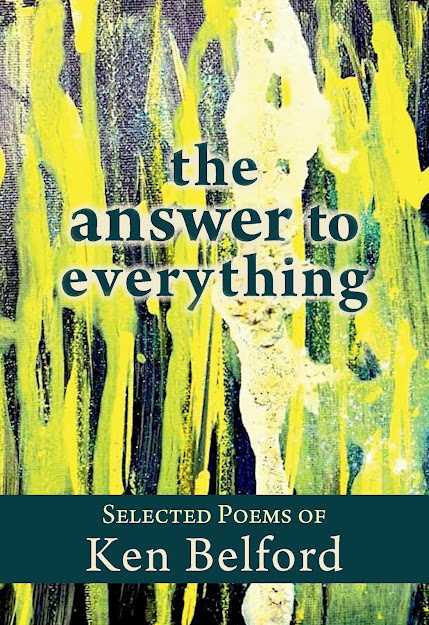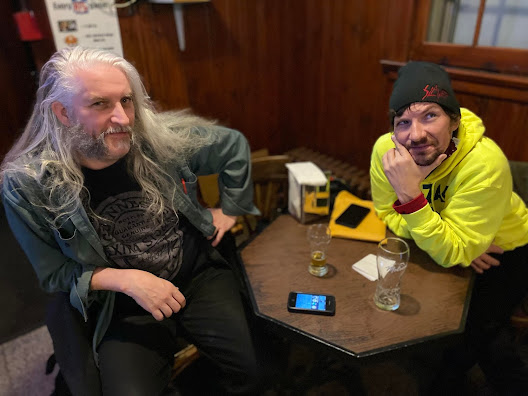the answer to everything: Selected Poems of Ken
Belford
Edited by Rob Budde and Si Transken, Consulting Editor
Jordan Scott
Caitlin Press, 2021
I am heartened to see the answer to everything: Selected Poems of Ken Belford (Caitlin Press, 2021), a selection of poems by the late Prince George eco-poet Ken Belford (1946-February 2020). Belford has long been an interesting figure in Canadian poetry, having first emerged through the shadow of a Vancouver poetry deep in the midst of TISH and TISH-affiliated poetics. He produced two books from those early days—Fireweed (Talonbooks, 1967) and The Post Electric Caveman (Very Stone House, 1970)—before disappearing from publishing almost entirely, up until the publication of his third trade collection, Pathways into the Mountains (Caitlin Press, 2000), although with occasional, small chapbooks poking holes through his publishing silence, including Sign Language (1976) and Holding Land (1981), both through Barry McKinnon’s Gorse Press.
Focused on showcasing the ethos behind the man behind the curtain, the answer to everything takes its title from the final poem included in this selection, a poem composed during Belford’s final months, and the one hundred and sixty page volume includes selections from the entirety of his publishing history, from those early two collections, as well as the books and chapbooks that marked his return: Pathways into the Mountains (2000), Ecologue (Harbour Publishing, 2005), When Snakes Awaken (Nomados, 2006), Lan(d)guage (Caitlin, 2008), Decompositions (Talonbooks, 2010), Internodes (Talonbooks, 2013) and Slick Reckoning (Talonbooks, 2016). As part of that re-emergence into publishing, after a lengthy period of publishing silence, Belford was also self-publishing chapbooks under the “off-set house” imprint, and a scan through my own archives reveals multiple titles: sequences (series 1) (2003), crosscuts (series 2) (2003), fragments (series 3) (2003), transverse (series 4) (2003) and seens (2008). I’m sure there were others.
I’ve always been fascinated by poets who engage in lengthy silences, irregardless of whether or not they ever return to publishing. One could point to Montreal poets Artie Gold and Peter Van Toorn, British Columbia poet David Phillips, Ottawa poet William Hawkins or even Phyllis Webb: poets who simply paused, whether no longer writing or no longer publishing, due to a variety of possible reasons. Why do engaged and otherwise active writers simply stop? Where do they go? Fortunately, for readers such as myself, Belford falls into the other camp: of poets who returned after a silence, although his falls into a silence lengthier that most. Monty Reid, for example, published multiple books up to his Flat Side (1998) from his home base of Alberta, but nothing else until he had been nearly a decade in Ottawa, publishing Disappointment Island (2006). Saskatchewan poet John Newlove had spent a decade publishing a book every year or two until the Governor General’s Award-winning Lies (1972), before an extended silence of new material that included a selected poems, The Fat Man: Selected Poems (1962-1972) (1977) and the long poem The Green Plain (1981) before his final full-length collection of new poems The Night the Dog Smiled (1986). But for a larger selected poems and his posthumous selected poems, there would only otherwise be the chapbook, THE TASMANIAN DEVIL and other poems (1999). Toronto poet Pier Giorgio Di Cicco published numerous books for some fifteen years until The Tough Romances (1990), with veritable publishing silence that extended until Living in Paradise (2001), a book that became the opening to his own return, bookending the time he spent in an Augustinian monastery north of Toronto. For Belford, as Budde’s introduction explores, it was a matter of shifting priorities, moving “deeper, further into the mountains, buying the rights to guide on the territory around what is known on most maps as Blackwater Lake,” where he and his partner, Alice, raised their daughter. As Budde offers, Belford “transitioned to a form of ecotourism (before the word existed) that was low impact and did not kill fish or animals.” It would only be further on, nearly four decades later, that he would come down the mountain (akin to Leonard Cohen leaving Mount Baldy) and eventually into Prince George that the poems would return.
While there is something obviously worthwhile to allowing the work to speak for itself, I would have been interested to hear Budde speak to the shifts he saw in Belford’s work over the years, especially during and around that extended gap between the publication of his second and third full-length collections. “There are many elements that distinguish Ken’s poetry in Canadian poetics; I will discuss very little of them here because I want to spend more time talking about his private process and worldview. He established a distinct assemblage poetics based on semantic slippage and disjunctive other-than-lyric ‘gaps.’ His ‘lan(d)guage’ is like nothing else; he tied the rhythms and codes of poetry to the natural dynamics of the unroaded mountain country, from the perspective of out there, looking back at the cities from the forest, from Blackwater Lake (T’amtuuts’whl’ax, north of Hazelton in the Skeena Mountains).” His was a poetic that evolved quickly from those early TISH-leanings into an accumulation of lyrics on his particular north, ecological concerns and about how one lives in the world as a human being. His widow, the writer and critic Si Transken, offers her own thoughts on his work in her “Afterword,” writing:
He wanted people to know that much of his poetry was meant to be read like a mobile. We are all accustomed to linear, rational, sequential words, lines, paragraphs, constructed from left to right on flat surfaces. His poetry was more like thoughts, images, feelings that floated near each other and were strung lightly on threads. He wished that different readers would take away different meanings. He wished the writing/reading and meaning construction to be a cooperative process. The material was also vulnerable to air temperature and movement (a fresh insight, a new strip of information).
In many ways, this might be an equally valid if not more important element of Belford’s poetics: how exactly he approached and engaged with the world around him, considerations that were foundational for his ongoing poetic. Further along in his introduction, Budde offers:
The word “interleaving” is one term I think accurately describes Ken’s compositional process; he would often take disparate semantic realms of thought and interweave them throughout a poem or set of poems. This juxtaposition functions not like a metaphor, but created resonances across the locations of thought in more subtle complicated ways. So, one of my reading strategies when spending time with a Belford poem is to open up my reading stance so I am not looking for a single line of argument or location of representation, or even two parallel tracks, but instead I am paying attention to the ways the zones interact, like the complex ecology of a place.
Part of what is interesting about the concerns that Belford had exist throughout: his ecological and geographic attentions and deep respect, one who listened deeply to the requirements of the responsibilities of those same attentions, and offering himself as a self-made and self-employed journeyman poet in the British Columbia wilderness. “Returning, but to a / different kind of solitude,” he writes, to open “In Solitude, I,” from his debut collection, “I remember when I was / in wilderness, I / put out the sound of the // paper, the poem / on it, refused it, / stapled it flat / on the door / in the wind [.]” Through those early poems he is already attentive to the land and all that surrounds it, offering a perspective and a respect through his first-person meditations. The poem “Erasure,” from the same collection, opens: “It is hard to tell how far away / The mountains really are. They seem closer, / But they must be fifteen miles, maybe more.” There is a straightforwardness, and an ease to his lyric, and even through those early works, his poetic is already deeply attuned to the eco-poetic he would come to be known for. Throughout those first two volumes, his poems are connected, but self-contained; he writes individual poems on the land, on weather, neighbours and his immediate. These are collections of lyric poems, shaped into book-length assemblages. His third and fourth collections, published post-break, form similar shapes and trajectories, although it does seem as though it is through his subsequent collection, Lan(d)guage, where he begins to shape the poems that would cohere into the best of his work: an open-ended long poem of short, untitled and accumulative bursts that slowly form a singular project across the remainder of his writing life, one that could easily fall underneath the umbrella title of that collection: “Lan(d)guage.” The poems through this period are dense, formed as structural echoes to each other, and suggest a particular kind of honed ongoingness, from one page to the next; one collection into the next. As one of those poems from Lan(d)guage, repeated within this selected, writes:
I slept beside a grizzly, each of us unaware
of the other, and when I awakened, heard
his breath next to mine. Time began for me
in that instant when I arose and saw him
sleeping there with a salmonberry leaf
on his head. No longer alone, all things since
are altered by that switch. What else is there
to know, each of us asleep and happy?
But he awakened just then and barreled off
into the brush, toward everything necessary.
At that moment everything I knew left me
and now a new world has taken place.
It comes to the same thing—astonishment
that this should happen at all. But I heard
him breathe, and saw him make tracks
before I could think. To see this thing
was not horrendous, and to see it go
was not delightful. Nothing meaningful
occurred, but time started with a big bear.
This is not about anything, but I’m waiting
for some thing to come up behind me
in the night. I’m like something else now,
and every breath I take anticipates
that moment I want again and again.
This is an impressive selection of the life’s work of a poet who left too soon, and hopefully, perhaps, an entry point for any new readers to further explore his work (I suspect most of his collections from the past decade or two might still be available). And the title poem, the one that closes the collection, does offer a particular kind of “summing up” of his poetics and concerns (much like, again, the final poems that make up Newlove’s THE TASMANIAN DEVIL). The poem opens with an echo of Prince George Barry McKinnon (who had long been a contemporary and close neighbour, and, until a particular and public “schism,” one of his closest companions through poetry), offering “i wanted to say something / about the tools i left behind / if snyder made his own axe handles / like i did when i lived in the mountains, / or if he just wrote about it.” Across nearly four pages, Belford offers his “final thoughts” on poetry, and poem-making. As the piece, and the selection, ends:
When i stepped out of line, out of
all the languages, all the stories
i remembered the answer to everything—
there’s always something wrong
with everything.
Born in Ottawa, Canada’s glorious capital city, rob mclennan [left; at the Carleton Tavern in Ottawa with Benjamin Rayner] currently lives in Ottawa, where he is home full-time with the two wee girls he shares with Christine McNair. His latest poetry title, the book of smaller (University of Calgary Press, 2022), is now available for pre-order. He is currently working on crafting the final draft of his suite of pandemic-era essays, composed during the first three months of original lockdown. Currently forty-eleven years old, he has decided to remain in his forties until the pandemic ends, likely entering his fifties “already in-progress.”







